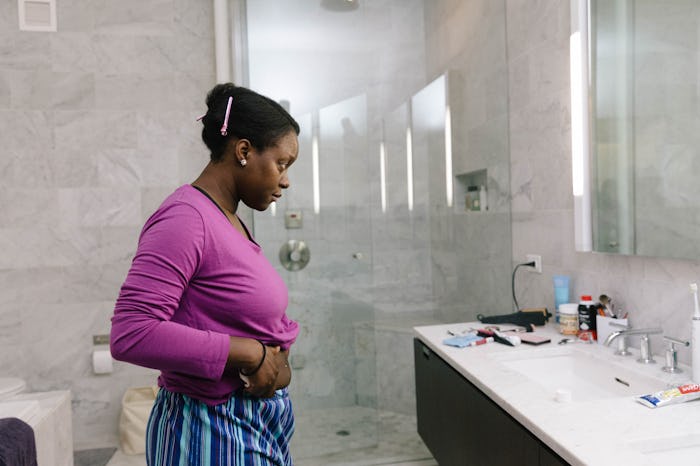Life
Your Menstrual Cramps May Be *Totally* Different After Having A Baby, So Yay (Or Ugh)
It's common knowledge that life changes — in nearly every possible way — after you have your first baby. The first months postpartum, in particular, are a biological and hormonal crucible. Your body, your mind, and your most important relationships all experience a seismic shift, and how could they not? Childbirth is a huge deal — a landmark in women's lives. When I was pregnant, I remember wondering what sort of mother I'd be. Also (and more superficially), will my hair fall out in the shower? And what about menstruation? Will my period cramps hurt more after having a baby? While terribly unfair, more painful cramps postpartum are a distinct possibility after you give birth. For me personally, they certainly packed a punch.
The first periods after you give birth are generally a little wacky as your body adjusts, reported Parents. If you don't breastfeed, that first period, which usually appears six-to-eight weeks after you give birth, may be heavy. If you nurse, you may get an extension on your menstruation vacation. But when your flow does finally return, it might linger — even for up to two weeks. However, Dr. Amy Peters, OB-GYN, MemorialCare Saddleback Medical Center, Laguna Hills, California, explains in an email interview with Romper that postpartum periods aren't always more painful than their pre-baby counterparts. Nevertheless, she likes to give women a helpful "heads up" that they might be crampy and heavy. "Some women are lucky and have lighter periods after delivery," she observes.
So what causes postpartum period pain? According to Peters, perception may play a role, but so does good old-fashioned biology:
"You've had a break from periods for almost a year, so part of it may just be forgetting what cramps feel like. But more likely the uterus is a bit more aggressive postpartum in its efforts to expel its contents. Your body is trying to protect itself from having bleeding issues, so it has very strong cramps to help shrink the uterus back to a more typical size."
And that's what I remember precisely. After nine months of living period-free, followed by several exhausting months spent caring for a newborn day and night, I was actually a little offended by my period when it showed up. The cramps felt like they were trying to squeeze the life out of me, and honestly reminded me of slightly more polite versions of my contractions. The good news is that these vicious vestiges of childbirth didn't last long. By round two of my period, they'd settled, thankfully, into the slight annoyances that I remembered.
Beyond cramping, I asked Peters if premenstrual symptoms (PMS) might be affected by childbirth. Peters observes that a change in your experience of PMS is possible, but that she doesn't see it very often. "Hormones do fluctuate, so it is possible to have an increase or decrease in PMS after each delivery," she writes.
As for menstruation itself, it's breastfeeding, rather than childbirth, that makes a difference in your periods. "The timing [of your period] can change, especially if lactating. A woman could have completely random periods for a year or sometimes longer after delivery," Peters explains.
On the bright side, Parents reported that some women actually experience milder menstrual cramps in the long run, possibly as a result of the uterus stretching in pregnancy. Unfortunately, others report more painful periods in the years after baby, and still others experience no change at all. In any case, if your symptoms are unpleasant during the rocky fourth trimester or shortly thereafter, there's no reason to assume that your cramps will continue to be the worst forever. This, too, will pass. If it doesn't, ask your doctor what might help.
Check out Romper's new video series, Romper's Doula Diaries:
Watch full episodes of Romper's Doula Diaries on Facebook Watch.
This article was originally published on
